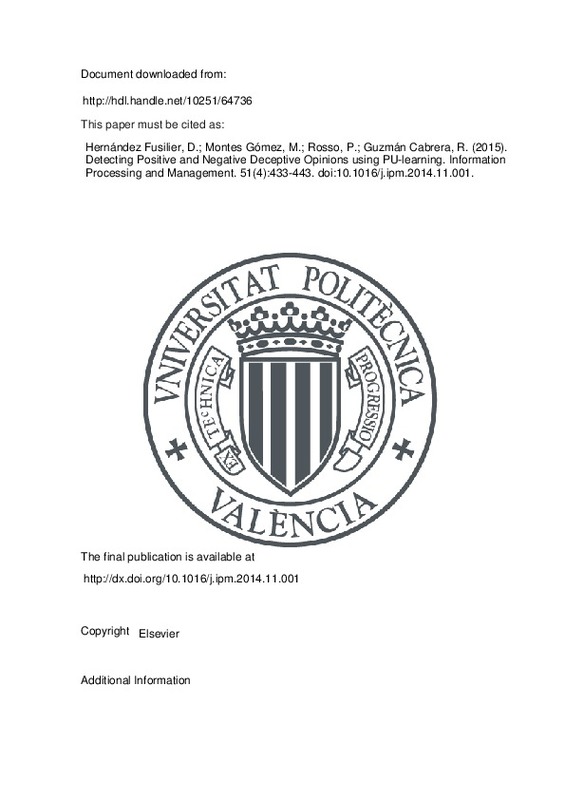JavaScript is disabled for your browser. Some features of this site may not work without it.
Buscar en RiuNet
Listar
Mi cuenta
Estadísticas
Ayuda RiuNet
Admin. UPV
Detecting Positive and Negative Deceptive Opinions using PU-learning
Mostrar el registro sencillo del ítem
Ficheros en el ítem
| dc.contributor.author | Hernández Fusilier, Donato
|
es_ES |
| dc.contributor.author | Montes Gómez, Manuel
|
es_ES |
| dc.contributor.author | Rosso, Paolo
|
es_ES |
| dc.contributor.author | Guzmán Cabrera, Rafael
|
es_ES |
| dc.date.accessioned | 2016-05-26T07:42:07Z | |
| dc.date.available | 2016-05-26T07:42:07Z | |
| dc.date.issued | 2015-07 | |
| dc.identifier.issn | 0306-4573 | |
| dc.identifier.uri | http://hdl.handle.net/10251/64736 | |
| dc.description.abstract | [EN] Nowadays a large number of opinion reviews are posted on the Web. Such reviews are a very important source of information for customers and companies. The former rely more than ever on online reviews to make their purchase decisions, and the latter to respond promptly to their clients’ expectations. Unfortunately, due to the business that is behind, there is an increasing number of deceptive opinions, that is, fictitious opinions that have been deliberately written to sound authentic, in order to deceive the consumers promoting a low quality product (positive deceptive opinions) or criticizing a potentially good quality one (negative deceptive opinions). In this paper we focus on the detection of both types of deceptive opinions, positive and negative. Due to the scarcity of examples of deceptive opinions, we propose to approach the problem of the detection of deceptive opinions employing PU-learning. PU-learning is a semi-supervised technique for building a binary classifier on the basis of positive (i.e., deceptive opinions) and unlabeled examples only. Concretely, we propose a novel method that with respect to its original version is much more conservative at the moment of selecting the negative examples (i.e., not deceptive opinions) from the unlabeled ones. The obtained results show that the proposed PU-learning method consistently outperformed the original PU-learning approach. In particular, results show an average improvement of 8.2% and 1.6% over the original approach in the detection of positive and negative deceptive opinions respectively. 2014 Elsevier Ltd. All rights reserved. | es_ES |
| dc.description.sponsorship | This work is the result of the collaboration in the framework of the WIQEI IRSES project (Grant No. 269180) within the FP 7 Marie Curie. The work of the third author was in the framework the DIANA-APPLICATIONS-Finding Hidden Knowledge in Texts: Applications (TIN2012-38603-C02-01) project, and the VLC/CAMPUS Microcluster on Multimodal Interaction in Intelligent Systems. | en_EN |
| dc.language | Inglés | es_ES |
| dc.publisher | Elsevier | es_ES |
| dc.relation.ispartof | Information Processing and Management | es_ES |
| dc.rights | Reserva de todos los derechos | es_ES |
| dc.subject | Opinion mining | es_ES |
| dc.subject | Opinion spam | es_ES |
| dc.subject | Deceptive opinions | es_ES |
| dc.subject | PU-learning | es_ES |
| dc.subject.classification | LENGUAJES Y SISTEMAS INFORMATICOS | es_ES |
| dc.title | Detecting Positive and Negative Deceptive Opinions using PU-learning | es_ES |
| dc.type | Artículo | es_ES |
| dc.identifier.doi | 10.1016/j.ipm.2014.11.001 | |
| dc.relation.projectID | info:eu-repo/grantAgreement/EC/FP7/269180/EU/Web Information Quality Evaluation Initiative/ | es_ES |
| dc.relation.projectID | info:eu-repo/grantAgreement/MINECO//TIN2012-38603-C02-01/ES/DIANA-APPLICATIONS: FINDING HIDDEN KNOWLEDGE IN TEXTS: APPLICATIONS/ | es_ES |
| dc.rights.accessRights | Abierto | es_ES |
| dc.contributor.affiliation | Universitat Politècnica de València. Departamento de Sistemas Informáticos y Computación - Departament de Sistemes Informàtics i Computació | es_ES |
| dc.description.bibliographicCitation | Hernández Fusilier, D.; Montes Gómez, M.; Rosso, P.; Guzmán Cabrera, R. (2015). Detecting Positive and Negative Deceptive Opinions using PU-learning. Information Processing and Management. 51(4):433-443. https://doi.org/10.1016/j.ipm.2014.11.001 | es_ES |
| dc.description.accrualMethod | S | es_ES |
| dc.relation.publisherversion | http://dx.doi.org/10.1016/j.ipm.2014.11.001 | es_ES |
| dc.description.upvformatpinicio | 433 | es_ES |
| dc.description.upvformatpfin | 443 | es_ES |
| dc.type.version | info:eu-repo/semantics/publishedVersion | es_ES |
| dc.description.volume | 51 | es_ES |
| dc.description.issue | 4 | es_ES |
| dc.relation.senia | 306221 | es_ES |
| dc.contributor.funder | European Commission | |
| dc.contributor.funder | Ministerio de Economía y Competitividad | es_ES |







![[Cerrado]](/themes/UPV/images/candado.png)

